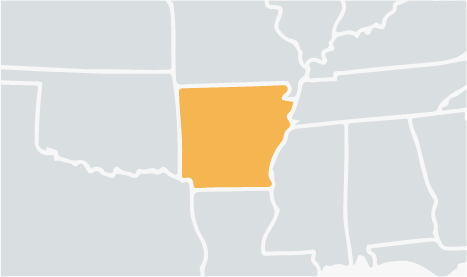| Subgrades | |
| Covered Speech: | C+ |
| Anti-SLAPP Procedures: | D+ |
| Subscores | |
| Covered Speech: | 70 out of 100 points |
| Anti-SLAPP Procedures: | 42 out of 100 points |
| Detailed Scoring on Anti-SLAPP Procedures | |
| Suspension of Court Proceedings Upon an Anti-SLAPP Motion: | 20 of 20 points |
| Burden of Proof on Plaintiff to Defeat an Anti-SLAPP Motion: | 12 of 12 points |
| Right to an Immediate Appeal: | 0 of 25 points |
| Award of Costs and Attorney Fees: | 10 of 40 points |
| Expansive Statutory Interpretation Instruction to Courts: | 0 of 3 points |
State Anti-SLAPP Statute
Arkansas’s anti-SLAPP statute,[1] the Citizen Participation in Government Act, protects both privileged communications (under the First Amendment) and the performance of acts in furtherance of the right to free speech and the right to petition government for a redress of grievances under the state or federal Constitutions in connection with an issue of public interest or concern. The acts that the statute covers include, but are not limited to, four classes of statements: (1) statements made before or to a legislative, executive, or judicial proceeding; (2) statements made to or before a proceeding authorized by a state or local government; (3) statements made in connection with an issue under consideration or review by a legislative, executive, or judicial body; and (4) statements made in connection with an issue under consideration or review before a proceeding authorized by a state or local government. Another provision also protects “[a]ll criticisms of the official acts of any and all public officers.” Although discovery, pending hearings, and motions are stayed once an anti-SLAPP motion is filed, a court may nonetheless order that specified discovery or other hearings or motions be conducted if good cause is shown. In the event that the anti-SLAPP statute governs the action, the statute requires the respondent to file a written verification under oath within ten days of the original filing that certifies that “(1) The party and his or her attorney of record, if any, have read the claim; (2) To the best of the knowledge, information, and belief formed after reasonable inquiry of the party or his or her attorney, the claim is well grounded in fact and is warranted by existing law or a good faith argument for the extension, modification, or reversal of existing law; (3) The act forming the basis for the claim is not a privileged communication; and (4) The claim is not asserted for any improper purpose such as to suppress the right of free speech or right to petition government of a person or entity, to harass, or to cause unnecessary delay or needless increase in the cost of litigation”; otherwise, the court will strike the claim. The statute does not provide for interlocutory appeal of an order granting or denying an anti-SLAPP motion. A court may award costs and attorney fees to the movant if the required certification is improperly verified.
How to Improve Arkansas’s Score
Arkansas should consider including a right to an “interlocutory” appeal as part of its law. Speaking generally, that is a request to a higher court for it to decide a particular issue immediately. In most litigation, interlocutory appeals are difficult to obtain, so this right of appeal is an important feature of an anti-SLAPP law. Without it, a defendant who loses an anti-SLAPP motion would be forced to continue to litigate the entire trial before the finding on the motion could ever be appealed.
As attorney Ken White has eloquently explained, the provision of a right of interlocutory appeal creates a strong protection for First Amendment liberties, because it “dramatically reduces the coercive effect of filing a lawsuit targeting speech.”
Strong anti-SLAPP laws impose notable costs on plaintiffs with weak or frivolous cases. One important feature of strong anti-SLAPP statutes is that they make losing plaintiffs liable for reasonable attorney fees and court costs originally borne by the speaker.
Unfortunately, Arkansas gives the court the option, not the requirement, of awarding reasonable attorney fees and court costs to prevailing defendants.
A mandatory fee-shifting provision would make it more likely that a defendant with limited financial resources who faces a SLAPP will be represented by an attorney. The prospect of fee-shifting encourages attorneys to provide such defendants with representation – especially when defendants face weak or frivolous claims.
The Uniform Law Commission model anti-SLAPP statute, and the best state anti-SLAPP laws, enable defendants to recoup the money they spent on legal costs. Requiring payment of reasonable attorney fees and court costs to prevailing speakers would provide deterrent effects against strategic lawsuits of dubious merit.
[1] Ark. Code Ann. § 16-63-501 through § 16-63-508.












